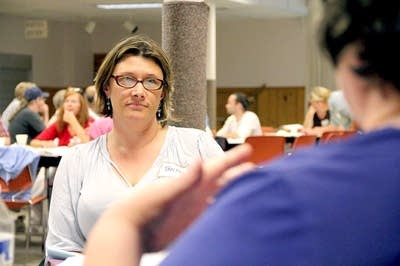East Siders concerned crime will return as St. Paul cuts back on extra police patrols
Go Deeper.
Create an account or log in to save stories.
Like this?
Thanks for liking this story! We have added it to a list of your favorite stories.

The extra police patrols deployed to St. Paul's East Side last month are beginning to recede, and that has many neighbors worried.
Operation Blue Wave was the police department's response to the deadly shooting of a teen boy and a group beating of a young man that nearly killed him.
The attacks were among the violent incidents this summer involving roving groups of teens who neighbors say have nothing better to do.
"The bad guys, they listen to the news, too," said Kathy Kieffer, one of about 80 residents of the Payne-Phalen neighborhood who gathered at Arlington Hills Lutheran Church for a community meeting Thursday night. "When they come on the news and say, 'They're pulling off the Blue Wave,' these bad guys know that. They're gonna come right back out."
Turn Up Your Support
MPR News helps you turn down the noise and build shared understanding. Turn up your support for this public resource and keep trusted journalism accessible to all.
Residents pleaded with police officials not to turn their backs on the neighborhood. Police say now that summer is coming to an end and some of the criminal activity has died down, the extra officers aren't needed.
But resident Greg Copeland challenged Assistant Chief Todd Axtell on the idea that things are somehow better. Copeland pointed to an editorial in the Pioneer Press about the summer's crime problems that quoted Mayor Chris Coleman.
"We've got the mayor saying we had an anomaly," Copeland said. "This is not an anomaly. We had a murder since we had the last crime meeting. It's disingenuous. It's not honest."
Axtell responded by saying police are doing the best they can with the resources they have.
About 20 of the 30 extra officers will likely pull out of the east side by the end of the month. The police department is still crunching the numbers to see how much of an impact the surge had.
But the meeting wasn't just about turning up the heat on the police. Many residents wanted to explore the root causes of youth violence.
They talked about the loss of recreation centers, concerns about parents not disciplining their kids, absentee landlords, and the stress of living in poverty.
Longtime resident Dale Rigwald says he sees idle kids of all ages in his neighborhood. Some even hang out in vacant houses.
"They're just running aimless," he said. "They should be out playing T-ball and football and enjoying the neighborhood."
Rigwald says vacant lots now replace a nearby playground and recreation center that he frequented while growing up. The city has been closing smaller centers and shifting to larger ones in recent years.
Many residents say if young people don't have positive things to do, they're more likely to commit crimes. Authorities charged a teenager in a street fight that gunned down 17-year-old Vincent Allison in July. And four young males were charged with beating a 26-year-old man who was trying to walk home in early August. The attack left Ray Widstrand with near-fatal brain swelling.
The Rev. Devin Miller moderates an online forum for Payne-Phalen. He says as unfortunate as the attack against Widstrand was, many community members saw it coming. Miller says that's because the east side has been neglected for years.
"There's been open drug sales that's been going on," Miller said. "There's been jaywalking. There's been problems of robbery and vandalism. These things have been going on the East Side. But there was no one willing to deal with it until this happened."
But that's not entirely true. Resident Mary Roberts notes that the community has rallied before and has beaten back challenges. She remembers arriving in the neighborhood about 20 years ago right around when a police officer was fatally shot.
"My husband and I deliberately moved here because we wanted to be part of what was going on on the East Side -- people fighting to improve their neighborhood. And if good people don't move in, we're lost," Roberts said.
But she admits some of that fighting spirit she once had has faded.
"I don't feel as hopeful as I did 25 years ago. I have a 'for sale' sign on my house right now. I want some peace."
Roberts says she just wants to know that she's going to be OK at night, and has no such guarantee now.





